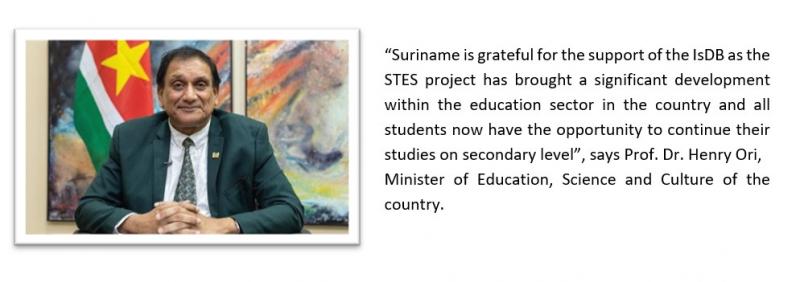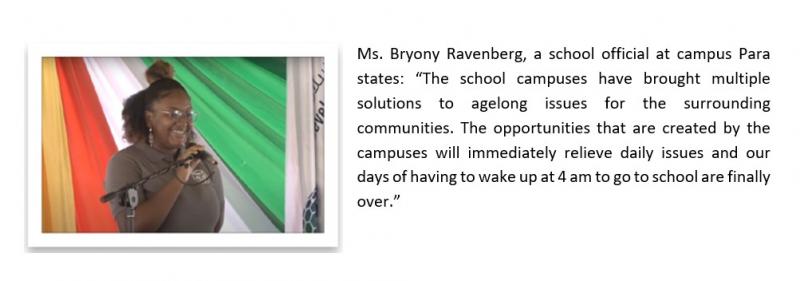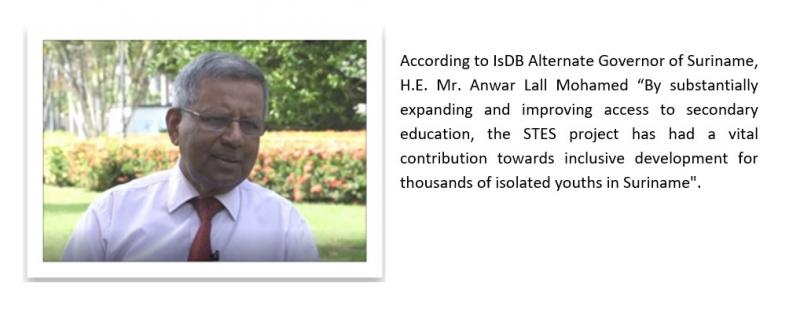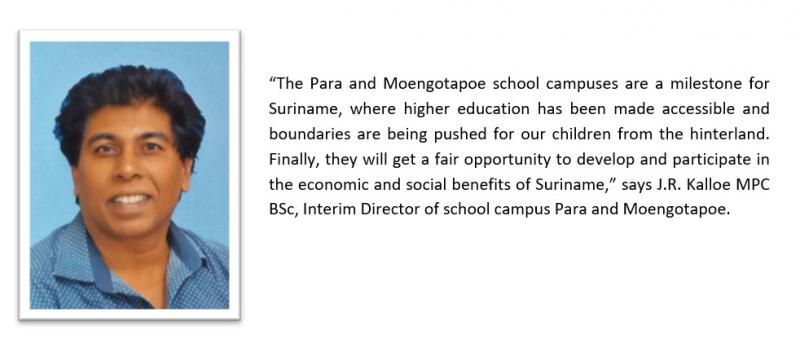IsDB’s US$30 Million Commitment to Education in Suriname
The Islamic Development Bank is funding a vital project in Suriname that provides education to thousands of young students who would otherwise have no school to go to.
Many are faced with travelling up to six hours every day and so just can’t make it to classes but now two campuses have been built with accommodation included.
This groundbreaking transformation is due to the US$33 million Secondary and Technical Education Support (STES) Project – with US$30.8 million financed by the IsDB.
The objective of STES is to increase access to and improve the quality of secondary and technical education.
STES is being carried out by Suriname’s Ministry of Education, Science and Culture of Suriname, in collaboration with IsDB’s Regional Hub Suriname.
School Campus Launch
On 29th September 2023, the soft launch of Suriname’s first school campus took place in the District of Para.
The ceremony was attended by the President of the Republic of Suriname, H.E. Chandrikapersad Santokhi, other senior state officials including Suriname Vice President, the Parliament Speaker and the Minister of Education, as well as Islamic Development Bank (IsDB) President, H.E. Dr. Muhammad Al Jasser, who was on official visit to the Bank’s member countries in South America.
H.E. President Chandrikapersad Santokhi stated that the STES school campus is not just an infrastructure project, but rather, it is a development project for the development of the nation.
IsDB President, H.E. Dr. Muhammad Al Jasser, stated: “IsDB will continue to support the Government of Suriname in meeting the most pressing socioeconomic development needs of the country.”
“The education sector is one of the major areas of focus for IsDB and we strongly believe that educating the youth and promoting inclusive education for all, particularly in the secondary and vocational education, plays a vital role in unleashing human capital and advancing the most inclusive and sustainable development,” the IsDB President added.
Collaboration between the Government of Suriname and the IsDB underlined their continuing commitment to fully establish this project, ensuring its effective, environment-friendly and sustainable operation.
The school campuses Moengotapoe and Para are huge assets for the country, especially for students from the far interior. The Ministry of Education, Science and Culture has expressed thanks for the support of the Islamic Development Bank and congratulated the entire Surinamese society on this milestone.

Increasing Access to Education
Deep in the South American country’s interior, where rainforests dominate the land towards the border with Brazil, there were no secondary level schools.
Students here had to spend at least 4-6 hours daily travelling between home and the classroom, which became a barrier for these children to receive their education.
But under the STES project, two secondary and technical education campuses have been constructed with boarding facilities that can accommodate 1,140 students.
These modern education centers in Para and Marowijne will offer a life-changing opportunity for students from these regions to learn in an environment that is familiar to them.
The school campus at Para consists of two school buildings with 24 classrooms, a lab with 12 workshops for around 760 students.

In addition, there are 10 student flats which can house 360 students, a campus deanery building with an auditorium and office spaces, a football field, a swimming pool, two canteens and a campus mall with retail units.
On the Moengotapoe campus there are 12 classrooms, a lab with 4 workshops for around 380 students. There are six student flats to accommodate 216 students and a basketball/volleyball sports field.
Increasing Quality Of Education
The wide-ranging STES project also aims to increase the quality of Secondary and Technical Education by creating 10 modern ICT labs, offering teacher training and the provision of laptops, textbooks and other educational materials.
It will also update the curriculum in two technical fields by integrating basic life skills.
The pioneering initiative will improve the monitoring and evaluation capacity of the Ministry of Education, Science and Culture.

Impacts and Outcomes

Already, this empowering new scheme has seen a 5% increase in student enrollment and graduation.
But this is just the beginning. By the end of 2024, it is expected to:
- Provide access to quality secondary and technical education for 1,140 students
- Accommodate 576 students with 24/7 housing facilities
- Establish 10 ICT labs in the 10 districts of the country
- Train 5,850 education professionals
- Deliver textbooks and other educational materials